Municipal leaders urge action to keep remote meetings alive
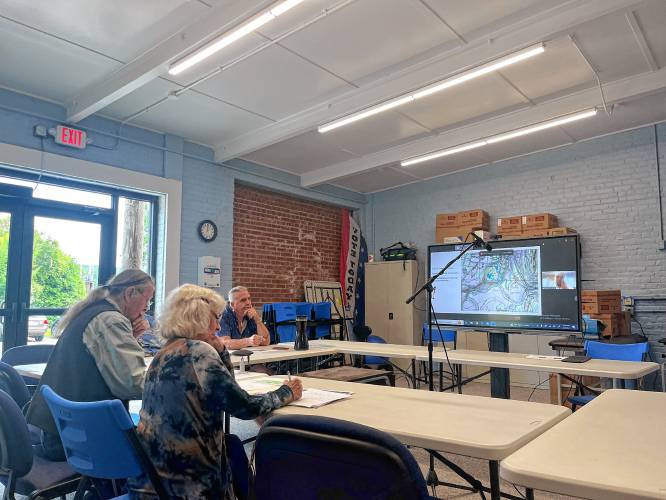
Members of the Montague Battlefield Study Advisory Board participate in a hybrid Zoom meeting in August 2024. STAFF PHOTO/ERIN-LEIGH HOFFMAN
| Published: 03-12-2025 6:09 PM |
From Brockton to Buckland and Northfield to Newton, more than 60 municipal officials are asking lawmakers to take swift action to allow them to continue to hold remote and hybrid public meetings beyond the upcoming March 31 expiration of that pandemic-era policy.
In a letter led by the Metropolitan Area Planning Council and the Massachusetts Association of Regional Planning Agencies, officials from 45 different communities said the remote and hybrid allowances tacked onto the Open Meeting Law in 2020 have made it easier both for residents to meaningfully participate in local government and for municipal officials to manage the increased activity.
“The flexibility to hold public meetings via in-person, hybrid or remote means is critical to ensuring that we can continue to provide maximum support and flexibility for our residents,” the letter reads. “These options we have had since the beginning of COVID to access public meetings should be made permanent. With over four years of these flexible meetings, our residents appreciate and have come to expect these options.”
Lawmakers have repeatedly extended the virtual meeting flexibility that began five years ago, but have not made them permanent and have often taken action right at the deadline.
The new version of Gov. Maura Healey’s local option tax bill, filed in January, would permanently authorize municipalities to permit hybrid public meetings. But open government and disability advocacy organizations came out in opposition to the fine details of Healey’s plan, saying her approach would “shut people out of the democratic process by only allowing — and not requiring — municipalities to provide hybrid participation options.”
As the law currently stands, public bodies are not required to provide remote access to a public meeting if it is held in a physical location that is open and accessible to the public. “Nonetheless, we encourage public bodies to provide multiple methods of access to a meeting when feasible,” the Attorney General’s Office said in guidance to communities.
If a public body is not meeting in an open and accessible physical location, it must provide live “adequate, alternative means” of public access to its deliberations, the AG’s office said.
Greenfield Mayor Ginny Desorgher is among the wsestern Massachusetts leaders who signed the letter. In an interview Wednesday afternoon, she spoke to the importance of a hybrid meeting policy in bolstering public access.
Article continues after...
Yesterday's Most Read Articles
Although Greenfield adopted a hybrid meeting policy during the COVID-19 pandemic, City Council, in December, passed Precinct 1 City Councilor Katherine Golub’s ordinance codifying the city’s hybrid meeting policy.
“There’s a lot of people that have trouble getting to night meetings. There are seniors that can’t see when it’s dark out and there are people who, when it’s icy out, are not going to leave their house,” Desorgher said. “This allows them to participate in school committee meetings or any other meetings. For young parents or those with disabilities, it gives them the opportunity that we should all have.”
While the letter requests that lawmakers consider funding the staffing, technological infrastructure and broadband improvements necessary for municipalities to carry on hosting hybrid meetings, Matthew Conway, a spokesperson for Desorgher’s office, said the city is aiming to improve its translation services.
“Greenfield has a rich Moldovan culture, so having language services that meet all of our audience is really important. As far as the technology, I think we’re really maximizing what we have. We really want to be a gold standard in meeting access,” Conway said. “In 2024, we had 70 more meetings that were published on [Greenfield Community Access Television] than in 2023 so it’s something we really take to heart, and are really going to continue to emphasize.”
According to Sunderland Town Administrator Becky Torres, her town only has one room that is equipped for hybrid meetings and, with state support, would like to further expand its hybrid access.
Like Greenfield, Torres noted that Sunderland has maintained a hybrid meeting policy since the pandemic. She said the ability to remotely watch public meetings has bolstered public engagement in local government, especially for the town’s disabled and aging population.
“Typically, a town has two or three meetings happening at the same time, so if you’re limited to only one facility for a hybrid meeting, you need more technology to support it,” Torres said. “We need more infrastructure, and that’s the reason for the request for more state funding to help support this.”
After Shelburne’s Selectboard voted in support of a hybrid meeting policy, Chair Rick LaPierre, who signed the letter to the state, said that although neighboring municipalities might benefit from state-funded broadband expansion, he does not believe Shelburne needs any infrastructure improvements to maintain its hybrid meeting policy.
“We’re fortunate to have internet available. I believe we’re nearly, if not 100%, covered for the town of Shelburne, but there’s outlying towns around us in West County who don’t have that luxury, who could certainly use additional internet service,” LaPierre said. “That’s the crux to the issue there, to try and make sure that internet is available to virtually everyone.”
Anthony Cammalleri can be reached at acammalleri@recorder.com or 413-930-4429.






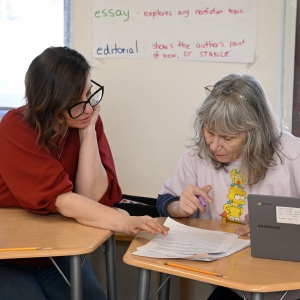 Literacy Project celebrating 40 years of education
Literacy Project celebrating 40 years of education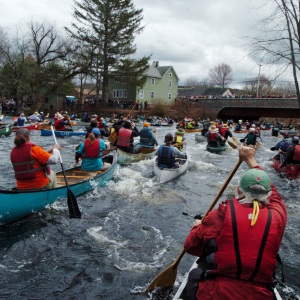 River Rat Race returns for 60th year on April 12
River Rat Race returns for 60th year on April 12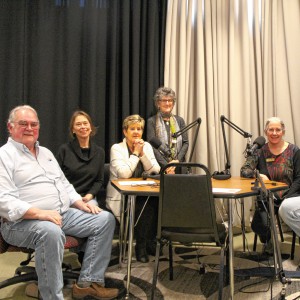 Backyard Oasis, connecting older adults with podcasts, celebrates 50 episodes
Backyard Oasis, connecting older adults with podcasts, celebrates 50 episodes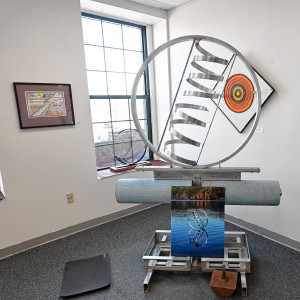 Stage on Main exhibit displays Athol resident’s work through the decades
Stage on Main exhibit displays Athol resident’s work through the decades
